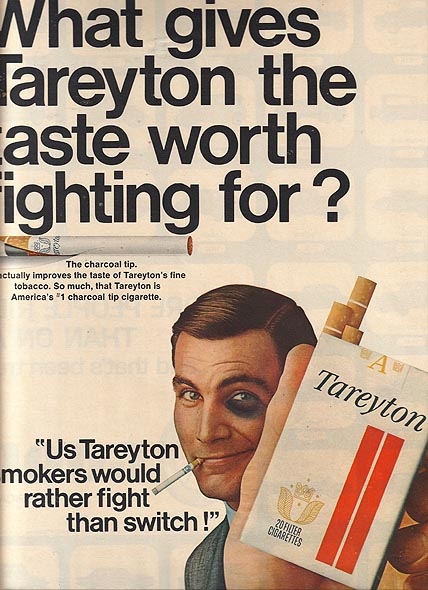During the opening of the hearing, chairman of the Energy and Commerce Subcommittee of Health and the Environment said "cigarettes are the single most dangerous consumer product ever sold. Nearly a half million Americans die every year as a result of tobacco." However, the damaging effects of tobacco were known far before the 90s. Studies and research done by the Journal of the American Medical Association linked lung cancer to smoking, by proving that tars from tobacco smoke were causes of the cancer in 1950.
Gradually as time and technology progressed, the public and lawmakers began to target tobacco companies about the health problems associated with smoking. This led to the government banning tobacco ads on television and the radio in 1969 and eventually up to the trial in 1994.
 During the time of the trial, the government was already aware of the health associations with cigarettes. However, they wanted to know if the tobacco companies were aware that nicotine was addictive. Because the hearing was broadcasted on both national television and radio, the whole country watched and listened as CEO's of tobacco tycoons denied any previous knowledge that nicotine was addictive.
During the time of the trial, the government was already aware of the health associations with cigarettes. However, they wanted to know if the tobacco companies were aware that nicotine was addictive. Because the hearing was broadcasted on both national television and radio, the whole country watched and listened as CEO's of tobacco tycoons denied any previous knowledge that nicotine was addictive.
Two years later, after the B&W documents and Jeffrey Wigand's interview with "60 Minutes" aired saying that "they knew you could get a fix", it became clear that all seven CEO's had committed perjury by lying under oath.
Wigand's blowing the whistle against the tobacco companies became a key factor in bringing this all to light, and after speaking on the issue, it only took one year for the government to crack down on anti-smoking legislation. Soon thereafter, the FDA regulated cigarettes as a drug delivery service and then in 1997 a bill was also passed that prohibited the sale or export of tobacco. Just a few months after the bill was passed Liggett Tobacco (one of the seven companies that testified) came out with a statement that was printed on their products "We at Liggett know and acknowledge that, as the Surgeon General and respected medical researchers have found, the addictive nicotine in cigarette smoking causes health problems, including lung cancer, heart and vascular disease and emphysema."
Though the event essentially tore apart Wigand's life and family, it generated a lot of public attention towards the tobacco companies and the health hazards that might not have been otherwise addressed.
Producing the movie "The Insider" also created more knowledge on the topic, and in an article published by Jeffrey Wigand in the British Medical Journal he said:
"The Insider, in addition to depicting tobacco industry executives accurately as merchants of death and greed who will do anything to save their addictive killing product, also dramatically shows how one person can make a difference by standing up and being counted. The power of the press and truth can win out. Movies have the capacity to make a difference; especially those that convey positive and realistic messages regarding tobacco use. Based on my experience and reading the research of the authors, I strongly support efforts that continue to demystify the labyrinth of misinformation the tobacco industry has fostered for so many decades."
No comments:
Post a Comment